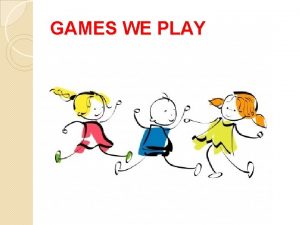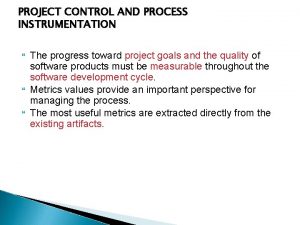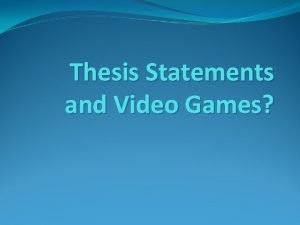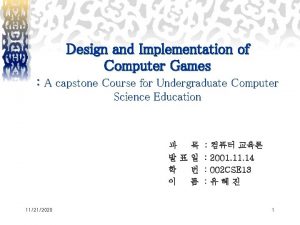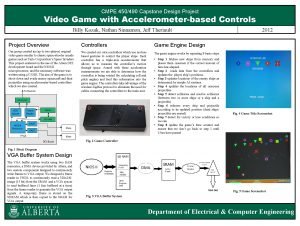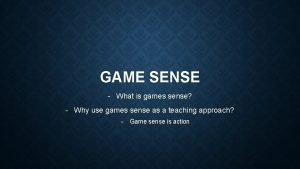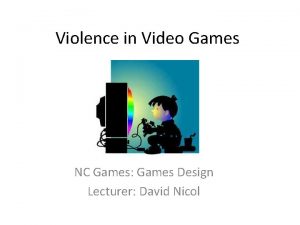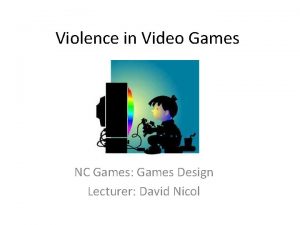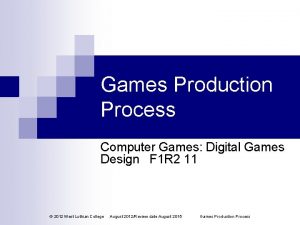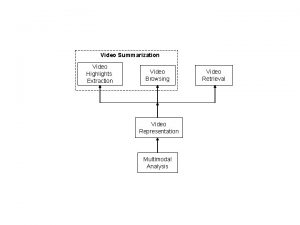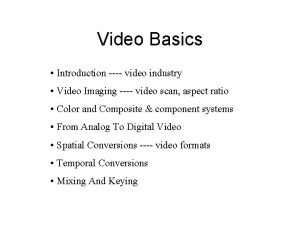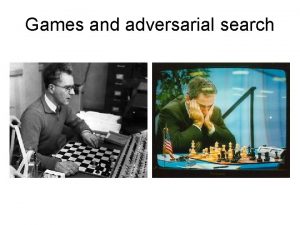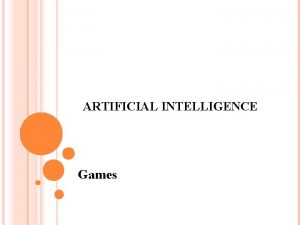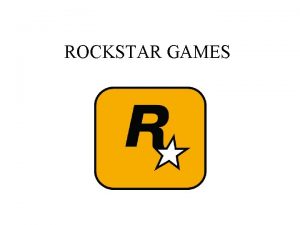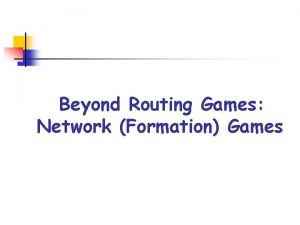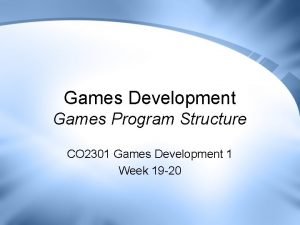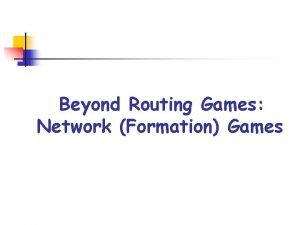Software Instrumentation of Computer and Video Games T




















- Slides: 20

Software Instrumentation of Computer and Video Games T. Bullen and M. Katchabaw Department of Computer Science The University of Western Ontario N. Dyer-Witheford Faculty of Information and Media Studies The University of Western Ontario

Introduction l During the runtime of an application, it is often beneficial to have management capabilities – – l For monitoring purposes For control purposes Having these capabilities enables us to sense the user’s experience, as well as tune application behaviour in order to improve this experience

Introduction l l l Computer and video game software is no different from traditional applications with respect to the need for manageability Except, of course, that very few have carried out research and development in this area to date This is unfortunate considering both the interesting problems that can be addressed using management techniques and the need for solutions to these unique problems

Introduction l To demonstrate the usefulness of software instrumentation to computer and video games, we present a case study in automating content analyses of games – l This includes a proof of concept system we developed using the Unreal Engine, and a discussion of our experiences in using this system to date First, however, we will examine our approach to software instrumentation …

Approach to Instrumentation

Automating Content Analysis l Content analyses of video games involve coding, enumerating, and statistically analyzing various elements and characteristics of games – l This includes violence, offensive language, sexual content, gender and racial inclusiveness, and so on While content analysis has its limitations, it is invaluable in providing a quantitative assessment of games to go with more qualitative analyses – It can be an important tool to many people dealing with various aspects of games and the games industry

Automating Content Analysis l Problems arise, however, when one tries to apply traditional content analysis processes, for example from film or television, to games – – Processes are manual and are consequently time consuming and labour-intensive This tends to result in significantly reduced play times or limiting analyses to only a very few games Traditional analyses also tend not to consider interactivity and non-linearity that occurs in games The rapid rate at which games are released and the industry evolves makes keeping up difficult

Automating Content Analysis l l In the end, with the limited time and resources often available, it is exceedingly difficult to perform thorough content analyses on even a reasonable portion of games To address these problems, this case study examines automating the process of content analysis for computer and video games – Through automation, it is hoped that time and resources can be used more efficiently and effectively to permit more thorough studies

Automating Content Analysis l l To automate content analysis, we take advantage of the fact that, unlike other forms of media, games are software executing on some kind of computing device This can permit two forms of automation: – – Partial automation: software executing along side the game monitors game execution and collects and reports the data normally collected manually Full automation: further software elements take the role of the player and generate gameplay experiences without the need for a human player

Proof of Concept l As a proof of concept, we have used our instrumentation framework to instrument Epic’s Unreal Engine to enable automated content analyses of Unreal-based games – l Unreal is a popular engine amongst professional and amateur developers, providing numerous possible games for content analysis experiments Instrumentation was implemented using the Unreal. Script language – Source level access to the engine was not available

Proof of Concept

Proof of Concept l Sensors have been developed to collect a wide variety of data useful for content analyses: – – l Death of characters, weapon use by characters, vehicular offences, use of offensive language, gender and racial diversity in characters, and a variety of other game statistics Data can be reported throughout a game or only as summaries at the end of games Sensors can be configured at run-time to tailor the data collected to the needs of the content analyses being conducted

Proof of Concept l l Actuators are currently under development for a variety of purposes They are primarily intended at this point at overcoming issues introduced by non-linearity and interaction in the game – – For example, this can force the completion of gameplay elements and objectives to control the flow of action in the game This can enable more thorough and efficient content analyses than what was previously possible

Proof of Concept Screen shot of content analysis mutator configuration screen

Experiences and Discussion l To validate our proof of concept system, we conducted several content analysis experiments on Unreal Tournament 2004 – l This series of games is one of the most popular driven by the Unreal Engine It is a fairly robust and flexible First Person Shooter that has numerous gameplay options – – – Several different game types and rule sets Individual and team-based games Single player, multiplayer, and spectator modes

Experiences and Discussion: Deathmatch Game ------Level Info------Level Name: Rrajigar Game Type: Death. Match Total Players: 14 AI Players: 13 Human Players: 1 Spectators: 0 Male Players: 13 Female Players: 1 Level Loaded: 0: 26: 45 Game Finished: 0: 30: 29 Gameplay Elapsed (Seconds): 240. 88 AI Dialog: 28 Human Dialog: 27 ----------------------All Player Stats-------Total Deaths: 47 Total Suicides: 1 Total Kills: 46 Total AI Deaths: 46 Total Human Deaths: 1 Total Deaths Caused By AIs: 22 Total Deaths Caused By Humans: 25 Total Female Deaths: 12 Total Male Deaths: 35 Total Deaths Caused By Females: 6 Total Deaths Caused By Males: 41 ---------------------Local Player Stats-------Player Deaths: 1 Player Suicides: 0 Player Killed: 1 Deaths Caused By Player: 25 Player Killed By AI: 1 Player Killed By Human: 0 Player Killed By Male: 1 Player Killed By Female: 0 AI Deaths Caused By Player: 25 Human Deaths Caused By Player: 0 Female Deaths Caused By Player: 7 Male Deaths Caused By Player: 18 Deaths Witnessed By Player: 29 -----------------------Expletives-----ass: 2 -----------------

Experiences and Discussion: Onslaught Game ------Level Info------Level Name: Arctic Stronghold Game Type: Onslaught Total Players: 12 AI Players: 11 Human Players: 1 Spectators: 0 Male Players: 9 Female Players: 3 Level Loaded: 23: 16: 43 Game Finished: 23: 32: 03 Gameplay Elapsed (Seconds): 964. 18 AI Dialog: 216 Human Dialog: 31 ----------------------All Player Stats-------Total Deaths: 142 Total Suicides: 5 Total Kills: 137 Total AI Deaths: 138 Total Human Deaths: 4 Total Deaths Caused By AIs: 119 Total Deaths Caused By Humans: 23 Total Female Deaths: 26 Total Male Deaths: 116 Total Deaths Caused By Females: 8 Total Deaths Caused By Males: 134 ---------------------Local Player Stats-------Player Deaths: 4 Player Killed: 4 Deaths Caused By Player: 23 Player Killed By AI: 4 Player Killed By Human: 0 Player Killed By Male: 4 Player Killed By Female: 0 AI Deaths Caused By Player: 23 Human Deaths Caused By Player: 0 Female Deaths Caused By Player: 9 Male Deaths Caused By Player: 14 Deaths Witnessed By Player: 43 -----------------------Team Info------Female Allies: 1 Male Allies: 4 Friendly Fire Deaths: 5 Allies Killed By Player: 0 Player Killed By Ally: 0

Experiences and Discussion l Quality of data – l Quantity of data – l Data collected through automation matched manual results, and in some cases was better We found that we could collect massive amounts of data with no visible impact on gameplay, even when data was reported in real-time throughout a game Partial versus fully automated analyses – – We found that results could be very different Which is ultimately better?

Concluding Remarks l l Management of computer and video games is a potentially rich, yet unexploited area for research and development Our own work in automating content analyses through software instrumentation represents an interesting step in this direction – Initial experimentation with a proof of concept system demonstrates its usefulness and shows great promise for the future

Concluding Remarks l Directions for future work include the following: – – – Continuing research, development, and experimentation in automating content analysis of game software Exploring how this software instrumentation can be adapted and extended for use in other computer and video games for other purposes Investigating how other tools and techniques of application management can be made use of in computer and video game software
 Types of games indoor and outdoor
Types of games indoor and outdoor Columbine shooting video
Columbine shooting video Project control and process instrumentation in spm
Project control and process instrumentation in spm What does cato say to katniss that makes her pause
What does cato say to katniss that makes her pause Thesis statement video
Thesis statement video Originality in video games
Originality in video games Valve corporation video games
Valve corporation video games My.com video games
My.com video games Baki video games
Baki video games Adjectives for video games
Adjectives for video games Santos
Santos Interactive storytelling for video games
Interactive storytelling for video games Video games
Video games Capstone video games
Capstone video games Capstone video games
Capstone video games Video games
Video games Video games that teach history
Video games that teach history Historia do video game linha do tempo
Historia do video game linha do tempo What is gamesense
What is gamesense Game
Game Open ended video games
Open ended video games
